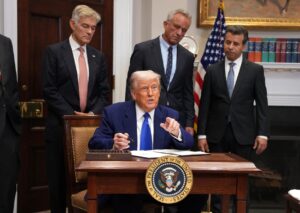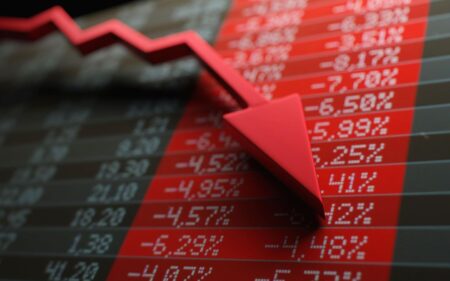The first part of May has been a particularly terrible period for short sellers, who lost $69.4 billion through May 9, according to data from Ortex. However, short sellers are having an outstanding year overall, gaining $63.1 billion year to date through May 9. March was a particularly good month, with short sellers gaining $86 billion, although they were down $14.7 billion for January.
Now with more than half the year left, some short sellers are anticipating a good year for the practice, while others remain a bit tentative on the topic. Nonetheless, at least two notable short sellers are adapting their practices to today’s market environment.
Will 2025 be a better year? It depends
Gabriel Grego of Quintessential Capital feels the current environment is favorable versus past years like 2021, although he admits there are causes for concern.
“Higher interest rates, political and trade uncertainties, and elevated valuation multiples have made investors more cautious and receptive to well-supported short theses,” Grego said in an email interview. “On the regulatory and legal side, however, the landscape is less clear. Recent policy shifts under the current administration have introduced some uncertainty, and it’s still too early to conclusively determine their full impact on short selling.”
He added that while regulators seem more market friendly in principle, practical enforcement, like the Federal Trade Commission’s stance on antitrust issues, hasn’t yet shown consistent support.
Regulatory barriers for short sellers
Grego expects these regulatory issues to continue which means it’s critical for short sellers to remain well informed and act prudently.
“Additional barriers include heightened litigation risk, limited stock borrow availability, the scarcity of reliable hedging instruments (crucial in today’s environment of frequent short squeezes), and occasionally hostile or indifferent media,” Grego adds. “Despite these obstacles, short selling is inherently specialized and challenging, attributes that simultaneously make it uniquely rewarding.”
Danny Moses of The Big Short and Flash Boys fame notes an important regulatory change. The Exchange Act Rule 13f-2 with related form SHO, which was due to go into effect this year, is a key regulatory barrier for short sellers, he believes. It requires certain institutional managers to report short-sale information to the Securities and Exchange Commission.
Investors have been given a year’s reprieve as the SEC provided a temporary exemption from compliance with the rule, extending it to 2026.
More factors to consider
Moses agrees that short sellers may not be entirely out of the woods yet. He noted in a recent interview that they have many more factors to consider now when shorting stocks versus in the past.
“Investors have to consider the Reddit crowd and the ‘animal spirits’ on social media,” Moses explains. The movement towards not lending out securities as a way to force shorts to cover. How politically connected a certain company might be regardless of fundamentals. Will regulators turn a blind eye? Lastly, the PR associated with being a short seller can be stressful.”
Why some short sellers are abandoning the practice
Many short sellers have turned their back on the practice over recent years for a variety of issues. One of the more recent was Nate Anderson, who decided in January to wind down his Hindenburg Research after finishing the pipeline of ideas they were working on.
Moses cited a few reasons he thinks some are causing the slowdown.
“First of all, the size of hedge funds these days inhibits single-stock short selling given economies of scale and inability to build a meaningful short position in any small/ mid-cap name,” he said. Most of the time, the best short-selling opportunities might be in less trafficked, more obscure stocks that are not covered by dozens of Wall Street analysts.”
Moses also pointed out that information today travels at the speed of light, making opportunities more fleeting.
“Short sellers can’t afford to build a position as time is not on your side,” he said. “I have seen data that suggests the most heavily shorted stocks are the worst performers over a long period of time.”
How Moses and Grego are adapting their strategies
Amid all the uncertainties, Moses and Grego are both adapting their strategies. Although Moses doesn’t manage other people’s money anymore and only trades for himself, he’s much more likely to use options, mostly put spreads, to express his short positions because of how the market dynamics have changed and due to the regulatory landscape.
Grego has adopted a more cautious stance over the last few years because of the growing regulatory uncertainty and greatly increased litigation rises.
“Companies are more aggressively pursuing lawsuits against short sellers, regardless of the merits, raising the inherent risks of this strategy,” he explained. “Nonetheless, we remain convinced that ethical activist short selling continues to play a valuable role and, when carefully managed, can still yield successful and rewarding outcomes.”
Banning short selling
Although the U.S. hasn’t made any moves to ban short selling recently, other countries have recently. Turkey banned short selling about a month ago, as did Thailand. South Korea recently lifted a short-selling ban that began in late 2023.
Grego believes bans on short selling often result from populist pressures and “political optics” instead of sound, economic reasoning.
“In my view, banning short selling is unequivocally misguided and detrimental, primarily harming retail investors in the long run,” he said. “Extensive academic research consistently demonstrates that banning short selling exacerbates market inefficiencies, promotes speculative bubbles, and enables fraudulent activities, all of which inevitably lead to greater financial instability. Short selling serves as an essential market stabilizer, and removing it deprives markets of an important protective mechanism.”
Moses agrees with Grego, saying that while countries ban short selling in an attempt to stabilize their markets, it removes liquidity and “raises more alarm bells.”
“I have lived through that during the GFC, and I wouldn’t rule out it happening again in the U.S.,” Moses added.
Short sellers as the market’s watchdogs
Despite the international bans on shorting securities, Grego and Moses agree that the benefits of the practice outweigh the risks. Moses pointed out that short sellers often draw attention to problems at companies that regulators overlook.
“If you believe that a company is overstating their profitability with accounting gymnastics or overly optimistic forecasts, it’s hard to depend on either regulators or research analysts to police that type of activity,” Moses explained. “The idea that you need SEC/ DOJ enforcement to expose either fraud or hold companies accountable can’t be your thesis.”
Similarly, according to Grego, the fundamental benefits of short selling have remained the same over the years.
He noted that short sellers “provide crucial skepticism and realism to financial markets, facilitating efficient price discovery and helping to contain speculative bubbles.” “Properly executed — ethically, professionally, and prudently — short selling acts as an essential market corrective mechanism,” Grego adds.
Read the full article here











